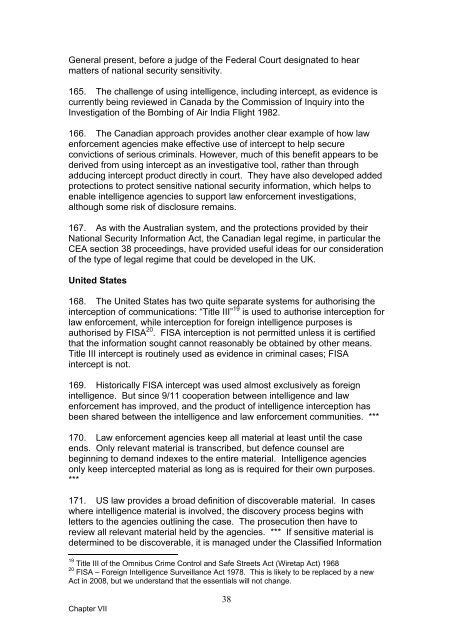Privy Council Review of intercept as evidence: report - Official ...
Privy Council Review of intercept as evidence: report - Official ...
Privy Council Review of intercept as evidence: report - Official ...
Create successful ePaper yourself
Turn your PDF publications into a flip-book with our unique Google optimized e-Paper software.
General present, before a judge <strong>of</strong> the Federal Court designated to hear<br />
matters <strong>of</strong> national security sensitivity.<br />
165. The challenge <strong>of</strong> using intelligence, including <strong>intercept</strong>, <strong>as</strong> <strong>evidence</strong> is<br />
currently being reviewed in Canada by the Commission <strong>of</strong> Inquiry into the<br />
Investigation <strong>of</strong> the Bombing <strong>of</strong> Air India Flight 1982.<br />
166. The Canadian approach provides another clear example <strong>of</strong> how law<br />
enforcement agencies make effective use <strong>of</strong> <strong>intercept</strong> to help secure<br />
convictions <strong>of</strong> serious criminals. However, much <strong>of</strong> this benefit appears to be<br />
derived from using <strong>intercept</strong> <strong>as</strong> an investigative tool, rather than through<br />
adducing <strong>intercept</strong> product directly in court. They have also developed added<br />
protections to protect sensitive national security information, which helps to<br />
enable intelligence agencies to support law enforcement investigations,<br />
although some risk <strong>of</strong> disclosure remains.<br />
167. As with the Australian system, and the protections provided by their<br />
National Security Information Act, the Canadian legal regime, in particular the<br />
CEA section 38 proceedings, have provided useful ide<strong>as</strong> for our consideration<br />
<strong>of</strong> the type <strong>of</strong> legal regime that could be developed in the UK.<br />
United States<br />
168. The United States h<strong>as</strong> two quite separate systems for authorising the<br />
<strong>intercept</strong>ion <strong>of</strong> communications: “Title III” 19 is used to authorise <strong>intercept</strong>ion for<br />
law enforcement, while <strong>intercept</strong>ion for foreign intelligence purposes is<br />
authorised by FISA 20 . FISA <strong>intercept</strong>ion is not permitted unless it is certified<br />
that the information sought cannot re<strong>as</strong>onably be obtained by other means.<br />
Title III <strong>intercept</strong> is routinely used <strong>as</strong> <strong>evidence</strong> in criminal c<strong>as</strong>es; FISA<br />
<strong>intercept</strong> is not.<br />
169. Historically FISA <strong>intercept</strong> w<strong>as</strong> used almost exclusively <strong>as</strong> foreign<br />
intelligence. But since 9/11 cooperation between intelligence and law<br />
enforcement h<strong>as</strong> improved, and the product <strong>of</strong> intelligence <strong>intercept</strong>ion h<strong>as</strong><br />
been shared between the intelligence and law enforcement communities. ***<br />
170. Law enforcement agencies keep all material at le<strong>as</strong>t until the c<strong>as</strong>e<br />
ends. Only relevant material is transcribed, but defence counsel are<br />
beginning to demand indexes to the entire material. Intelligence agencies<br />
only keep <strong>intercept</strong>ed material <strong>as</strong> long <strong>as</strong> is required for their own purposes.<br />
***<br />
171. US law provides a broad definition <strong>of</strong> discoverable material. In c<strong>as</strong>es<br />
where intelligence material is involved, the discovery process begins with<br />
letters to the agencies outlining the c<strong>as</strong>e. The prosecution then have to<br />
review all relevant material held by the agencies. *** If sensitive material is<br />
determined to be discoverable, it is managed under the Cl<strong>as</strong>sified Information<br />
19 Title III <strong>of</strong> the Omnibus Crime Control and Safe Streets Act (Wiretap Act) 1968<br />
20 FISA – Foreign Intelligence Surveillance Act 1978. This is likely to be replaced by a new<br />
Act in 2008, but we understand that the essentials will not change.<br />
Chapter VII<br />
38
















